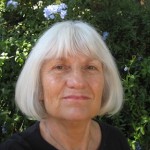Nonfiction author Gretchen Woelfle says she suffers from an incurable disease: research rapture. She’s happiest digging through books, footnotes, scholarly articles, and primary sources for information about her latest historical subject. “It’s so hard to stop researching because it’s so much more fun than writing,” she says. “I hate writing the first draft. It’s so hard for me to spit it out.” Once the first draft is written, though, Woelfle (pronounced wolf-lee) enjoys revising and cutting to make what she calls her “wretchedly awful first draft” shine.
Woelfle takes her inspiration from “real life, real people, [and] real incidents. Our world is so incredibly interesting.” Several of her books focus on little-known remarkable women from history. Her research on one subject frequently leads her to another. For instance, Woelfle wrote Write on, Mercy! The Secret Life of Mercy Otis Warren, a picture book biography about a female historian and political activist from the Revolutionary War. In addition to reading material about her subject, Woelfle also read other books about the Revolution where she found a reference to Elizabeth “Mumbet” Freeman, a slave who sued the Commonwealth of Massachusetts for her freedom, and the subject of Woelfle’s most recent title Mumbet’s Declaration of Independence.
Research about Mumbet led Woelfle to other Revolutionary War-era African Americans profiled in her 2016 release Answering the Cry for Freedom: African Americans and the American Revolution. “The American Revolution had an enormous impact on African Americans because they heard all that talk about equality and liberty,” Woelfle says. The book chronicles the dramatic stories of seven men and six women from the 18th century. “It’s a part of history that isn’t really studied by kids. When they think of African American slavery they think of the 19th century…the Underground Railroad, Sojourner Truth, Harriet Tubman, Frederick Douglass…and the Abolitionists leading up to the Civil War.”
Woelfle chooses subjects who have achieved something remarkable and who have “bucked the system” in some way. “[They have] an inner strength, a resilience, and a native intelligence—even if they’re not highly educated” to persevere and take on challenges. Woelfle believes that biographies are the best of fiction and nonfiction. “You have a character and the drama of an individual person, but you don’t have to make up the plot.” Unfortunately, the record of an individual person can be full of gaps that challenge a biographer. “When there are holes in the record, you can’t make it up,” Woelfle says. “All those years where you don’t know what happened, or you know what happened, but you don’t know what the person felt about it.”
Travel is a large part of Woelfle’s research process for each biography. “I try to go to the places where the people lived because the landscape, the climate, the geography impacted [their lives].” When writing Answering the Cry for Freedom, she started in Monticello, Virginia and stopped in Philadelphia, Boston, the Berkshires, and Nova Scotia.
Site research also lent an air of authenticity to her one and only novel, All the World’s a Stage: A Novel in Five Acts. Prior to writing the story, Woelfle was reading a biography of William Shakespeare. A dispute he had with his landlord over his theater at the time planted a seed for the novel. “I did the research in London.” Her daughter lived in London at the time and Woelfle visited every year. “The research was so much fun. I went to plays at the Globe Theater. I rode around the city on a bicycle because the street plan is the same as it was [in Shakespeare’s time].”
In fact, Woelfle Skyped from London for this interview. She frequently participates in home exchanges, living in a London house while the occupants live in her home in Los Angeles. Even in London, she keeps to her disciplined writing and research schedule five days a week, preferring to write at her desk rather than coffee shops or libraries. She treats herself to a workout at the gym at the end of the day, and if the weather permits, boogie boarding on the California coast.
Don’t expect Woelfle’s next book to be about Abraham Lincoln or Harriet Tubman. “I want to write about people who kids haven’t heard about,” she says. “There are so many stories that haven’t been told.”


